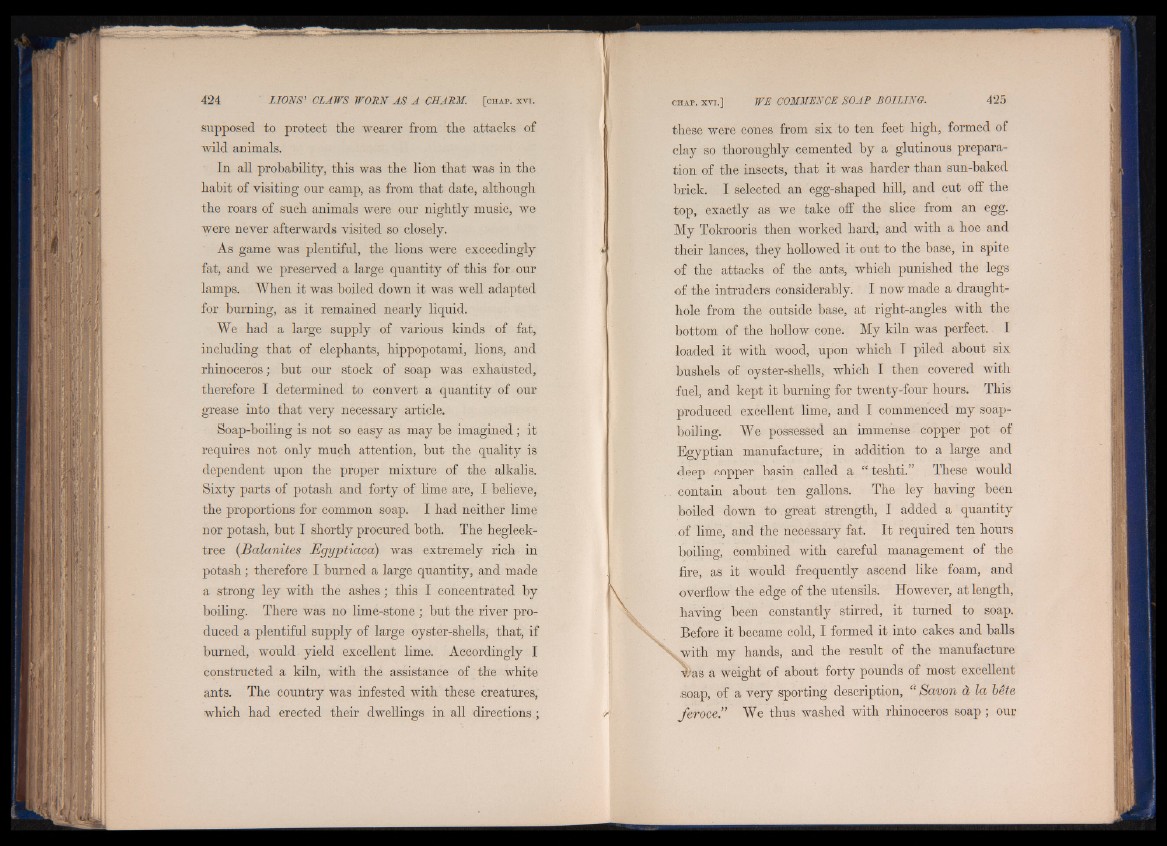
supposed to protect the wearer from the attacks of
wild animals.
In all probability, this was the lion that was in the
habit of visiting our camp, as from that date, although
the roars of such animals were our nightly music, we
were never afterwards visited so closely.
As game was plentiful, the lions were exceedingly
fat, and we preserved a large quantity of this for our
lamps. When it was boiled down it was well adapted
for burning, as it remained nearly liquid.
We had a large supply of various kinds of fat,
including that of elephants, hippopotami, lions, and
rhinoceros; but our stock of soap was exhausted,
therefore I determined to convert a quantity of our
grease into that very necessary article.
Soap-boiling is not so easy as may be imagined; it
requires not only much attention, but the quality is
dependent upon the proper mixture of the alkalis.
Sixty parts of potash and forty of lime are, I believe,
the proportions for common soap. I had neither lime
nor potash, but I shortly procured both. The hegleek-
tree {Balanites Egyptiaca) was extremely rich in
potash; therefore I burned a large quantity, and made
a strong ley with the ashes; this I concentrated by
boiling. There was no lime-stone ; but the river produced
a plentiful supply of large oyster-shells, that, if
burned, would yield excellent lime. Accordingly I
constructed a kiln, with the assistance of the white
ants. The country was infested with these creatures,
which had erected their dwellings in all directions;
these were cones from six to ten feet high, formed of
clay so thoroughly cemented by a glutinous preparation
of the insects, that it was harder than sun-baked
brick. I selected an egg-shaped hill, and cut off the
top, exactly as we take off the slice from an egg.
My Tokrooris then worked hard, and with a hoe and
their lances, they hollowed it out to the base, in spite
of the attacks of the ants, which punished the legs
of the intruders considerably. I now made a draught-
hole from the outside base, at right-angles with the
bottom of the hollow cone. My kiln was perfect. I
loaded it with wood, upon which I piled about six
bushels of oyster-shells, which I then covered with
fuel, and kept it burning for twenty-four hours. This
produced excellent lime, and I commenced my soap-
boiling. We possessed an immense copper pot of
Egyptian manufacture; in addition to a large and
deep copper basin called a “ teshti.” These would
contain about ten gallons. The ley having been
boiled down to . great strength, I added a quantity
of lime, and the necessary fat. It required ten hours
boiling, combined with careful management of the
fire, as it would frequently ascend like foam, and
overflow the edge of the utensils. However, at length,
having been constantly stirred, it turned to soap.
Before it became cold, I formed it into cakes and balls
\ with my hands, and the result of the manufacture
\f/as a weight of about forty pounds of most excellent
.soap, of a very sporting description, “ Savon a la Mte
feroce.” We thus washed with rhinoceros soap ; our